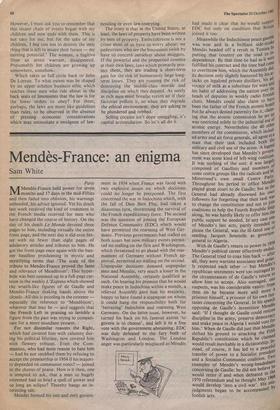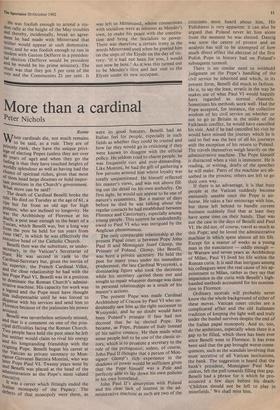Mendes-France: an enigma
Sam White
Paris
MMendes-France held power for seven months and 17 days in the mid-Fifties and then faded into oblivion, his warnings unheeded, his advice ignored. Yet his death last week received the kind of treatment in the French media reserved for men who have changed the course of history. On the day of his death Le Monde devoted three pages to him, including virtually the entire front page, and the next day it did even bet- ter with no fewer than eight pages of adulatory articles and tributes to him. He got the front page once again with the ban- ner headline proclaiming in mystic and mystifying terms that 'The scale of the tribute to Mendes-France proved the fame and relevance of Mendesism'. This hyper- bole was best summed up in a full-page car- toon in the weekly L'Express which showed the wraith-like figures of de Gaulle and Mendes-France shaking hands above the clouds. All this is puzzling in the extreme especially the reference to `Mendesism', whatever that may be — and suggests that the French Left in praising so lavishly a figure from the past was trying to compen- sate for a more mundane present.
For not dissimilar reasons the Right, which had covered him with calumny dur- ing his political lifetime, now covered him with flowery tributes. Even the Com- munists, who had most reason to hate him — had he not snubbed them by refusing to accept the premiership in 1954 if his majori- ty depended on communist votes? — joined in the chorus of praise. How is it then, one is tempted to ask, that a man so hugely esteemed had so brief a spell of power and so long an eclipse? Thereby hangs an in- teresting tale.
Mendes formed his one and only govern-
ment in 1954 when France was faced with two explosive issues on which decisions could no longer be postponed. The first concerned the war in Indochina which, with the fall of Dien Bien Phu, had taken a disastrous turn, threatening the survival of the French expeditionary force. The second was the question of joining the European Defence Community (EDC) which would have permitted the rearming of West Ger- many. Previous governments had stalled on both issues but now military events permit- ted no stalling on the first and Washington, which threatened to go ahead with the rear- mament of Germany without French ap- proval, permitted no stalling on the second. Unpopular decisions demand unpopular men and Mendes, very much a loner in the National Assembly, certainly qualified as such. On hearing his promise that he would make peace in Indochina within a month, a relieved Assembly gave him his majority, happy to have found a scapegoat on whom it could hang the responsibility both for `betraying' Indochina and rearming West Germany. On the latter issue, however, he turned his back on his famous axiom 'to govern is to choose', and left it to a free vote with the government abstaining. EDC was duly defeated to the fury both of Washington and London. The London anger was particularly misplaced as Mendes
had made it clear that he would suPPnrt EDC but only on condition that Britain joined it too. Meanwhile the Indochinese peace gamble was won and in a brilliant side-stroke Mendes headed off a revolt in Tunisia bY putting that country on the road to in" dependence. By that time he had as it were fulfilled his contract and the time had come to overthrow him, which the Assembly did, its decision only slightly hastened by his at- tacks on legalised private distillers, his ad- vocacy of milk as a substitute for wine and his habit of addressing the nation over the heads of deputies in weekly radio fireside chats. Mendes could also claim to have been the father of the French atomic bony but he always denied paternity for it, ing that the atomic commission he set tlP, was restricted solely to the industrial use 01 atomic energy. Nevertheless the 40 other members of the commission, which inchtel" ed army and air force generals, all agree to a man that their task included both the, military and civil use of the atom. A legend has since developed that Mendes's govern- ment was some kind of left-wing coalition. It was nothing of the sort: it was largely composed of Gaullists and members of some centre groups like the radicals and M. Mitterrand's own small Centre Parry' Throughout his period in office Meri,_'. played great court to de Gaulle; but as the General had already disowned his own followers for forgetting that their task was to change the constitution and not to .011 coalitions to help the Fourth Republic HO along, he was hardly likely to offer him the public support he needed. In any case one of Mendes's last acts, partly intended to please the General, was the ill-fated one °f. sending Jacques Soustelle as governor- general to Algeria. 1958 With de Gaulle's return to power in Mendes's political career effectively ended. The General tried to coax him back — after all, they were wartime associates and great- ly respected each other — but Mendes s republican sentiments were too outraged bY the circumstances of de Gaulle's return r° allow him to accept. Also outraged, one suspects, was his considerable vanity: from then on he became more and more a prisoner himself, a prisoner of his own fan: tasies concerning the General. In his speech opposing de Gaulle's investiture Mendes said: 'If I thought de Gaulle could restore discipline in the army, preserve democracy and make peace in Algeria I would vote for him.' When de Gaulle did just that Mende,s, shifted his ground to attacking the Fifth Republic's constitution which he dahlia' would result inevitably in a dictatorship. In- stead, of course, it has led to a peaceful transfer of power to a Socialist president and a Socialist-Communist coalition. TWO examples of Mendes's wrong-headedness concerning de.Gaulle: he did not believe he would retire if and when defeated in the 1970 referendum and he thought May 1968 would develop 'into a civil war'. His mis- judgments ts.enatcsbegan to be accompanied bY foolish He was foolish enough to attend a stu- dent rally at the height of the May troubles and thereby, incidentally, break an agree- Ment he had made with Mitterrand that neither would appear at such demonstra- tions; and he was foolish enough to run in tandem with Gaston Defferre in a presiden- tial election (Defferre would be president
and he would be his prime minister). The result was that they got 5 per cent of the vote and the Communists 21 per cent. It was left to Mitterrand, whose connections with socialism were as tenuous as Mendes's own, to make his peace with the constitu- tion and bring the Socialists to power. There was therefore a certain irony in the words Mitterrand used when he greeted him on the steps of the Elysee on the day of vic- tory: 'If it had not been for you, I would not now be here.' As it was this turned out to be Mendes's first and last visit to the Elysee under its new occupant.











































 Previous page
Previous page